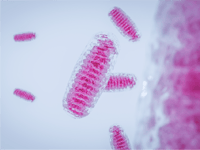 Parkinson's Disease (PD) remains the second-most common neurodegenerative disorder behind Alzheimer's Disease, and the incidence of patients being diagnosed with PD will only rise as we all get older. With this in mind, much personnel and resources are dedicated to discovering more about this disease and to develop better treatments and management strategies to improve the livelihoods of those afflicted with PD. April is Parkinson's Awareness Month, and this is a perfect time for us not only to raise funds and awareness to help PD patients, but also to learn about how companies like ABclonal can help accelerate the research behind PD onset and progression. Here, we highlight studies using ABclonal products that were published within the past year that add new insights into Parkinson's research.
Parkinson's Disease (PD) remains the second-most common neurodegenerative disorder behind Alzheimer's Disease, and the incidence of patients being diagnosed with PD will only rise as we all get older. With this in mind, much personnel and resources are dedicated to discovering more about this disease and to develop better treatments and management strategies to improve the livelihoods of those afflicted with PD. April is Parkinson's Awareness Month, and this is a perfect time for us not only to raise funds and awareness to help PD patients, but also to learn about how companies like ABclonal can help accelerate the research behind PD onset and progression. Here, we highlight studies using ABclonal products that were published within the past year that add new insights into Parkinson's research.
Calcium, Parkin, and Mitochondria
As we know regarding the vesicular transport system, dysregulation of protein degradation is associated with various neurological disorders including PD. Some PD cases can arise due to heritable mutations in certain genes, such as Parkin, a component of an E3 ubiquitin ligase complex. Parkin also happens to be functionally associated with another PD gene that encodes proteins that are imported into mitochondria, and this process normally helps clear out damaged mitochondria through a specialized form of autophagy known as mitophagy. Calcium signaling is also involved in regulation of mitochondrial movement to facilitate mitophagy, but the exact mechanisms were poorly understood.
 The authors of this study in Cell Death & Differentiation sought to explore the role of calcium in mitophagy. Based in Italy, Marchesan et al. utilized ABclonal's RHOT1/MIRO1 and Parkin antibodies to complement their elegant elucidation of a calcium-dependent mechanism wherein the calcium-dependent phosphatase calcineurin promotes Parkin recruitment to mitochondria to allow mitophagy. The authors also showed that activating calcineurin allowed for mitophagy in neurons in a Drosophila model with mitochondrial defects that recovered their locomotor functions. Allowing the proper clearance of damaged mitochondria could help prevent the build up of reactive oxygen species that in turn drives inflammatory responses, which if harnessed could help reduce the severity of PD and other neurodegenerative disorders.
The authors of this study in Cell Death & Differentiation sought to explore the role of calcium in mitophagy. Based in Italy, Marchesan et al. utilized ABclonal's RHOT1/MIRO1 and Parkin antibodies to complement their elegant elucidation of a calcium-dependent mechanism wherein the calcium-dependent phosphatase calcineurin promotes Parkin recruitment to mitochondria to allow mitophagy. The authors also showed that activating calcineurin allowed for mitophagy in neurons in a Drosophila model with mitochondrial defects that recovered their locomotor functions. Allowing the proper clearance of damaged mitochondria could help prevent the build up of reactive oxygen species that in turn drives inflammatory responses, which if harnessed could help reduce the severity of PD and other neurodegenerative disorders.
Antibodies in this study:
Parkin (A0968); see also A11172
RHOT1/MIRO1 (A22551)
Source: Marchesan et al. (2024) "Activation of Ca2+ phosphatase Calcineurin regulates Parkin translocation to mitochondria and mitophagy in flies." Cell Death Differ 31(2):217-238.
Another Mitochondrial Mechanism for PD
 We know from many years of medical research that PD results from damage or death of neurons that produce dopamine, leading to the various symptoms that include loss of fine motor control. A common biomarker of PD is the accumulation of Lewy bodies in neurons, which represent the aggregation of certain proteins such as alpha-synuclein. As with the previous study, this study led by collaborators from Canada were also interested in the role of mitochondria in the maintenance of normal nervous function. The movement of mitochondria from one part of a neuron to another is important to ensure the proper supply of energy to where it is needed most. Their goal was to find a link between the Lewy body formation via alpha-synuclein aggregates and mitochondrial dysfunction, given evidence of alpha-synuclein interaction with mitochondria and their effects on mitochondrial fusion, fission, transport, and mitophagy.
We know from many years of medical research that PD results from damage or death of neurons that produce dopamine, leading to the various symptoms that include loss of fine motor control. A common biomarker of PD is the accumulation of Lewy bodies in neurons, which represent the aggregation of certain proteins such as alpha-synuclein. As with the previous study, this study led by collaborators from Canada were also interested in the role of mitochondria in the maintenance of normal nervous function. The movement of mitochondria from one part of a neuron to another is important to ensure the proper supply of energy to where it is needed most. Their goal was to find a link between the Lewy body formation via alpha-synuclein aggregates and mitochondrial dysfunction, given evidence of alpha-synuclein interaction with mitochondria and their effects on mitochondrial fusion, fission, transport, and mitophagy.
Using a light-induced protein aggregation (LIPA) tool to precisely control the aggregation of alpha-synuclein, and ABclonal's PLSCR3 antibody, the researchers showed that knocking down the expression of PLSCR3, which is involved in cardiolipin transport to the outer mitochondrial membrane, could block the degradation of mitochondria induced by LIPA of alpha-synuclein. Their results demonstrated that the aggregation of alpha-synuclein, and not simply its overexpression, also affected mitochondria in other ways, including their total number, depolarization, and energy production. While an intriguing and exciting result, the complexity of Parkinson's pathogenesis could make it difficult to precisely control the aggregation of this key protein. However, this is a promising starting point from which to build therapy!
Antibody in this study:
PLSCR3 (A12371); see also A20915
Source: Lurette et al. (2023) "Aggregation of alpha-synuclein disrupts mitochondrial metabolism and induce mitophagy via cardiolipin externalization." Cell Death Dis 14(11):729 (Epub).
Raising Awareness and Driving Innovative Research
 If you have spare moments or dollars, you can always volunteer your time and charity to help those in need suffering from PD, as well as those who care for PD patients. You can find links to various organizations such as the Michael J. Fox Foundation and the Parkinson's Foundation in our previous blog on PD.
If you have spare moments or dollars, you can always volunteer your time and charity to help those in need suffering from PD, as well as those who care for PD patients. You can find links to various organizations such as the Michael J. Fox Foundation and the Parkinson's Foundation in our previous blog on PD.
In addition to providing high-quality, cost-effective reagents and custom services, ABclonal works to save you money down the line when you turn your research into publications! If you have published with ABclonal products featured in your research, please visit our citations promotional page to submit your articles and you can earn a 25% off voucher on catalog products. Thank you for being our customers, and here's to us working together to grow the global knowledge base and helping humanity!




